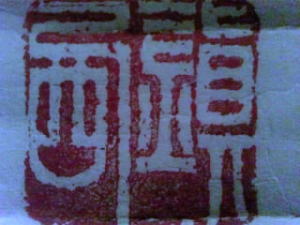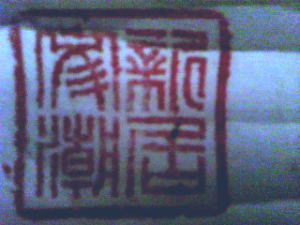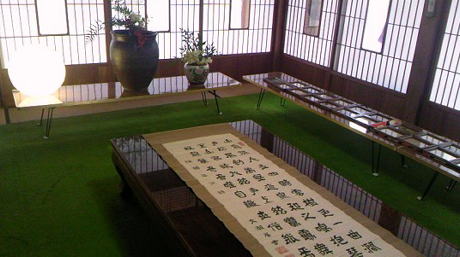お問合せ
事務局・工房くらし月
A poem with mystery
********************
Introduction
This poem does not have the "second phrase" which is
the key phrase for the Chinese poetry.
Why? It was an error?
*****************
Who wrote the calligraphy?
This calligraphy has two seals.
(Read from right to left)
Seal ① Chinzei (The calligrapher's name)

Seal ② Buncho ( a pen name)

Details of this person who wrote the calligraphy are not well known.
**********************
Why it does not have the second phrase?
The calligrapher was probably fluent in Chinese, named “Chinzei / Buncho”
who was probably a Buddhist monk in the Edo period, and who might have
been a great fan of Jozan Ishikawa.
Jozan Ishikawa's poetry was so popular that the monk, the calligrapher,
may have created a quiz by intentionally excluding the second phrase which
conveyed the meaning of “always exists”.
I think this is a poem that shows the popularity of Ishikawa's poetry.
Rhyme Record (including Japanese Kanji ) ② unwritten
① 山気殊人世 〇●〇〇● (仄)仄平平仄 shān・qì・shū・rén・shì
② 常 含 太古情 〇〇 ●● 〇 平平仄仄平 cháng・xián・tài・gǔ・qíng
③ 四時雲樹色 ●〇〇●● (平)平平仄仄 sì・shí・yún・shù・sè
④一曲澗泉声 ●●●〇〇 (仄)仄仄平平 yì・qǔ・jiàn・quán・shēng
⑤ 松風動萬壑 〇〇●●● 平平仄仄仄 sōng・fēng・dòng・wàn・hè
⑥夜泉和之鳴 ●〇●〇〇 仄平仄平平 yè・quán・hè・zhī・míng
⑦抱琴座空山 ●〇●〇〇 仄平仄平平 bào・qín・zuò・kōng・shān
⑧寫欲入弦声 ●●●〇〇 仄仄仄平平 xiě・yù・rù・xián・shēng
⑨上弦鸞靏舞 ●〇〇●● 仄平平仄仄 shàng・xián・luán・hè・wǔ
⑩下弦蛟龍驚 ●〇〇〇〇 仄平平平平 xià・xián・jiāo・lóng・jīng
⑪奇音唯自識 〇〇〇●〇 平平平仄平 Qí・yīn・wéi・zì・shí
⑫世俗能為名 ●〇〇〇〇 仄平平平平 shì・sú・néng・wéi・míng
Rough meaning
The atmosphere of the mountain is different
from that of our ordinary world
Clouds and trees change with season
The sound of the valley water you can hear
Wind blows across pine trees
The spring in the valley sounds at night with wind
I am alone in the mountain with an instrument
trying to copy the sound of the song
The treble is as light as a legendary bird
The bass is as majestic as a legendary beast
The beautiful sound will be naturally known
(The second phrase I did not write will be naturally known)
I wonder if you can say its name.
(So what is the second phrase?)
************************
Original poem by Jozan Ishikawa
(including Japanese Kanji )
五言律詩 題 幽居即事
① 山気殊人世 〇●〇〇● 平仄平平仄 shān・qì・shū・rén・shì
② 常含太古情 〇〇 ●● 〇 平平仄仄平 cháng・xián・tài・gǔ・qíng
③ 四時雲樹色 ●〇〇●● 仄平平仄仄 sì・shí・yún・shù・sè
④ 一曲澗泉声 〇●●〇〇 平仄仄平平 yī ・qǔ・ jiàn ・quán ・shēng
⑤ 雨湿鶯衣重 ●●〇〇●仄仄平平仄 yǔ ・tà ・yīng ・yī ・zhòng
⑥ 風暄蝶袖軽 〇〇●●〇 平平仄仄平 fēng・ xuān ・dié ・xiù ・qīng
⑦ 為詩難至老 〇〇〇●●平平平仄仄 wéi ・shī ・suī・ zhì ・lǎo
⑧ 未使鬼神驚 ●●●〇〇仄仄仄平平 wèi ・shǐ ・guǐ ・shén ・jīng
Rough meaning
The atmosphere of the mountain is different
from that of the ordinary world
Always exists the heart of the ancient
Clouds and trees change with season
The sound of the valley water you can hear
The rain wets the wings of the nightingale heavily
The wind lightly flutters the wings of the butterfly
A poem that impresses the spirits of nature,
which I can not yet create though I became old
*******************

Photo The Toki Museum 2015
********************
Photo: Fukuoka Pref. and Oita Pref. Landscape in Japan
 |
 |
 |
 |
 |
 |
English Top
***********************
copyright: 2019 the Toki Museum
バナースペース
shop infoTHE TOKI MUSEUM
THE
TOKI
MUSEUM
PRIVACY POLICY
FACEBOOK
TWITTER
BLOG
JAPANESE
The Toki Museum